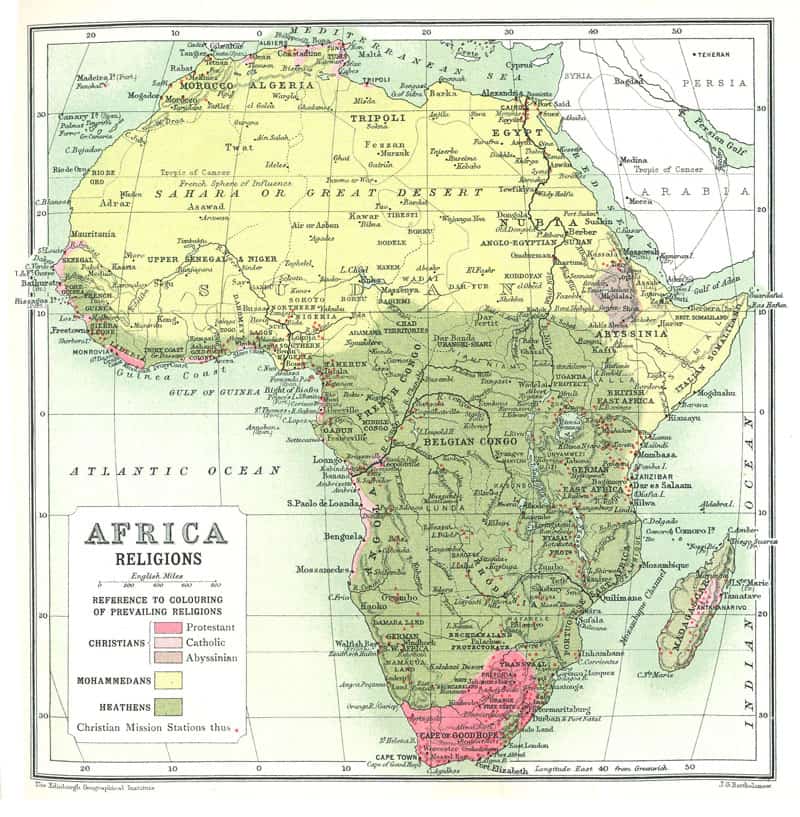Future of Africa: A Missions Textbook by Donald Fraser

This text-book is the fifth in a series of textbooks issued conjointly by the leading rnissionary societies in Great Britain for the use of Study Circles. Like its predecessors, “The Uplift of China,” “The Desire of India,” “The Reproach of Islam,” and “The Decisive Hour of Christian Missions,” the book has been written and edited with its special purpose in view. It is designed primarily for the use of those who study it chapter by chapter and meet periodically in Study Circles for discussion.
Editorial Note, page iii.
Donald Fraser, noted missionary to Malawi, discusses mission work among the pagan races of Central and South Africa. My thanks to Redcliffe College for providing a copy of this public domain title for digitisation.
Donald Fraser [1870-1933], The Future of Africa. London: United Council for Missionary Education, [1911]. Hbk. pp.293. [Click to visit the download page for this title]
Contents
- Editorial Note
- Author’s Preface
- Early Discovery
- The Opening Up of Pagan Africa
- The Hand of Europe in Africa
- The Conditions Revealed
- The Hand of the Church in Africa
- Results of Mission Work
- The Needs of Pagan Africa
- The Church’s Task
- Appendices
- Bibliography
- Index
Chapter 1: Early Discovery
From time immemorial Africa has held its fascination or the hum.an race. Greece embodied Africa in myth; Rome sent her legions thither in lust of conquest; Gaul sent her traders in search of barter and commerce; in North Africa there were reared some of the earliest leaders and saints of the Christian Church. Looking down the early centuries we search vainly, however, for further records of Africa than dim hints of futile attempts to cross her sealed threshold The spent waves of past humanity seem but to have swept to her edge, and then to have broken and retreated with the tide.
If we turn from yesterday to to-day, what have we? Africa-but yesterday chiefly a name and a by-word, to-day assuming rank as a great world force, covered with an advancing network of civilisation, a region of illimitable possibilities. The causes that have furthered this development, the purpose that underlies it, the responsibility the Christian world bears towards its furtherance, such questions constitute the theme of this book.
Africa of to-day presents a complex picture. In area, a “vast ill-formed triangle,” the continent covers eleven and a half million miles in space. Each side of the triangle is pierced by a mighty river; on the north the Nile, on the west the Congo, on the east the Zambesi. An African traveller has roughly classified the great continent thus: North Africa where men go for health, South Africa where they go for wealth, Central Africa where, they go for adventure. Its population of about one hundred and sixty millions seems enormous. Yet, in comparison to the area it is small, and computed at fifteen to the square mile. Its races are innumerable; its dialects a vast confusion. The climate of Africa is modified by its elevation above the sea-level, but two-thirds of the continent lies within the tropics. The religions of Africa may be unequally divided under three heads: Christianity, Mohammedanism, and Paganism. Africa’s territorial divisions are, in the main, a matter of recent history. Eight million square miles of its area are partitioned amongst the various European powers.To Britain the appeal of Africa is specially strong. Pioneers, missionaries, traders, travellers, soldiers, civil servants, serried rank upon serried rank have flowed out from this tiny island kingdom, many of them to live and die for that far country. For all types of men, Africa holds an abiding fascination. The student, the trader, the hunter, the philanthropist, firstly and lastly the evangelist, each and all have felt it, and in each case it differs. The riddle of the human race, its origin and development, the greed of gain, the desire for sport and adventure, the love of fellowmen, the sense of the mysterious awful responsibility of millions of souls still ignorant of Christ. All this is embodied in Africa and has its significance for the readers of her story….
Pages 1-4.
